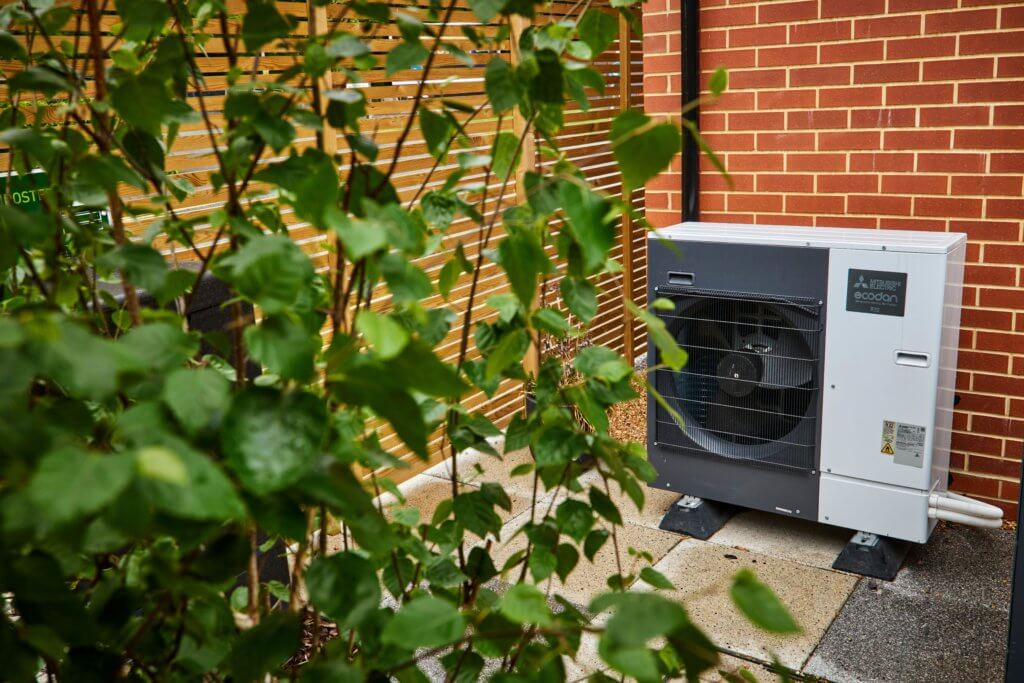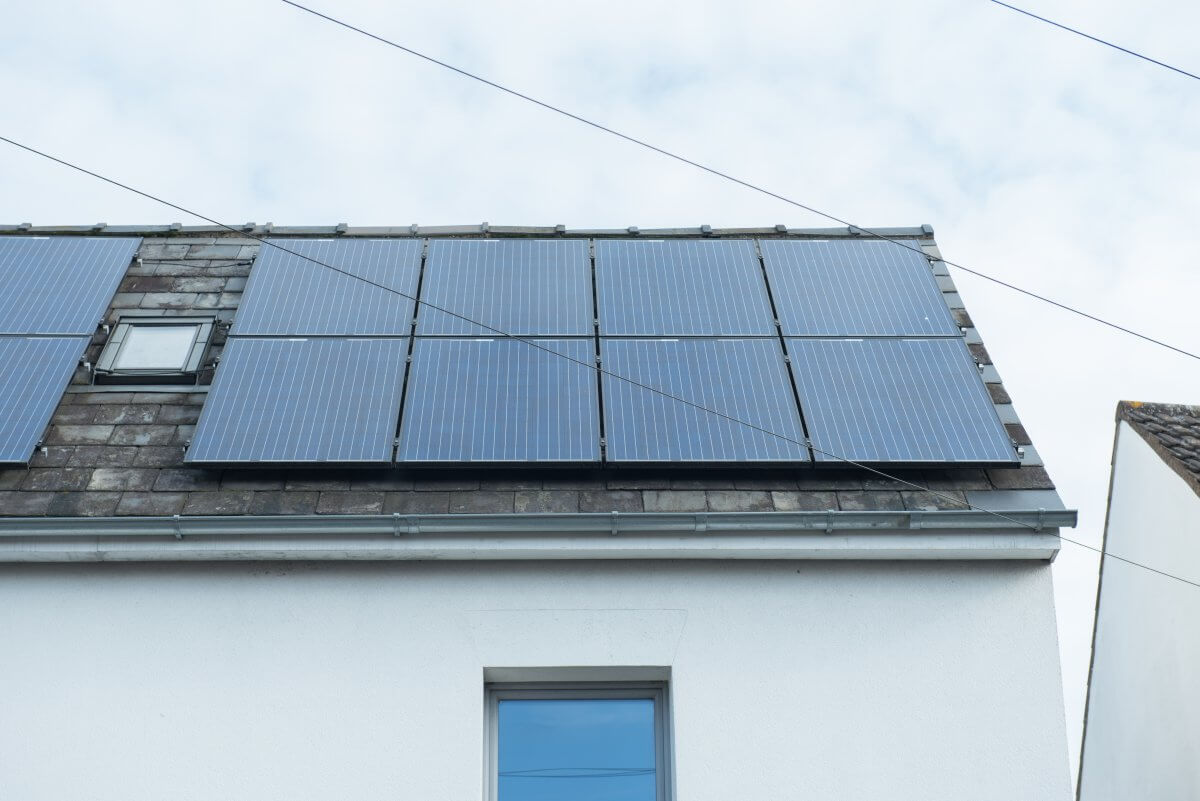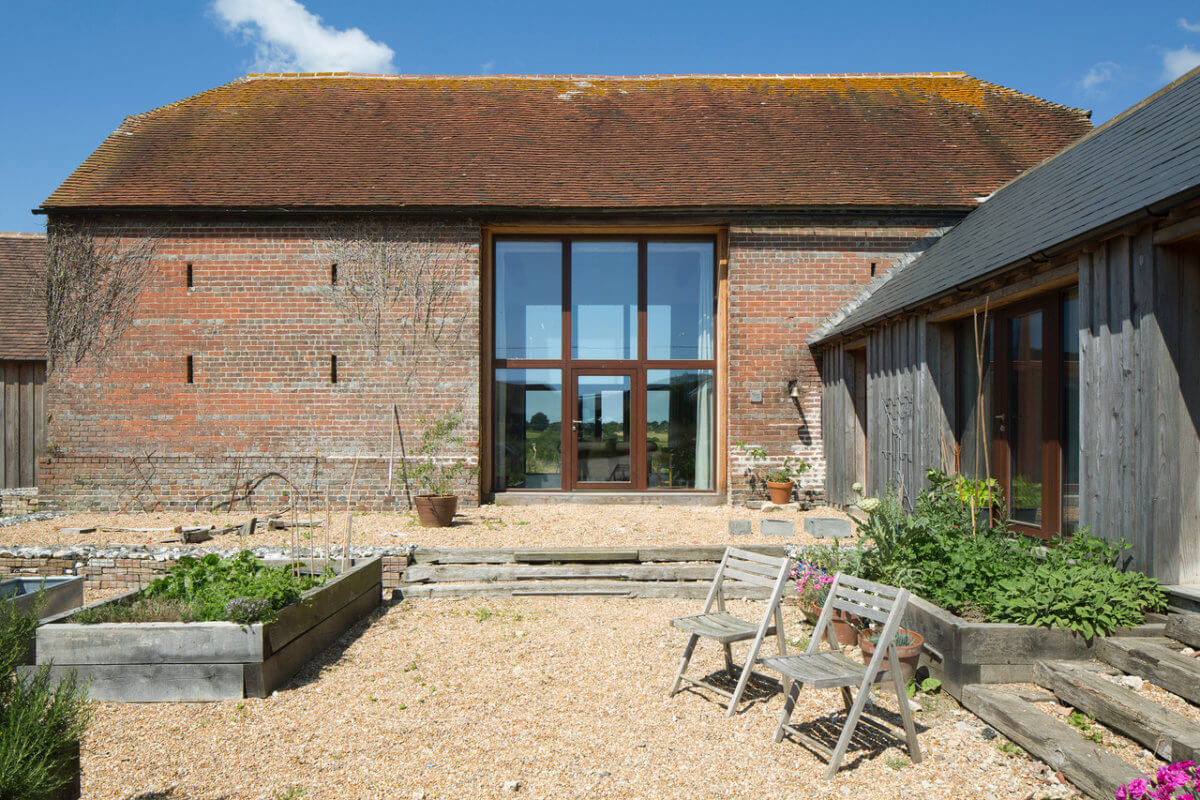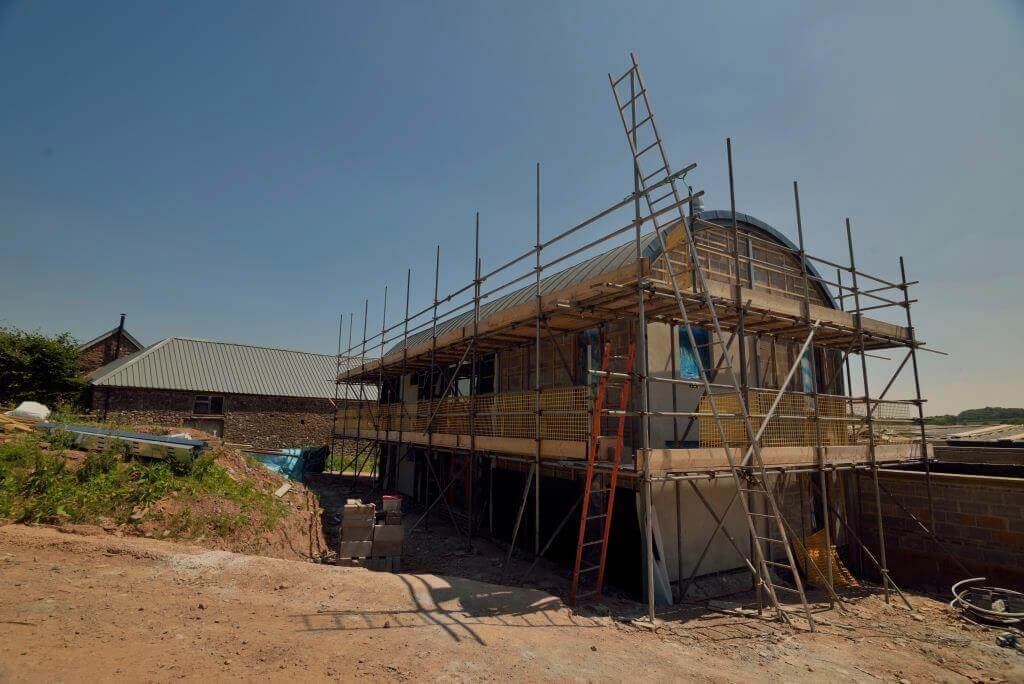Renewable Heating Systems: Heat Pumps

The Problem with Gas Central Heating
As we saw in our previous blog on energy efficient insulation, it is estimated that 17% of the UK’s total carbon emissions come from home heating, and the majority of this comes from gas generated heating systems and boilers. The problem with gas is that when it is burned it releases carbon dioxide. On average, a UK household’s gas boiler emits 2.2 tonnes of CO2 per year. That’s roughly equivalent to seven transatlantic flights or leaving a 10w bulb on for 139 years!
If you are considering an energy efficient renovation or retrofit of an old property, the most effective way to cut home heating carbon emissions is to stop using gas and replace it with electricity. By using renewable sources such as wind or solar energy, electricity is easier to produce without generating carbon. In fact, in the last ten years the UK has decarbonised the electricity grid faster than any other country, almost halving its carbon intensity. Of course, more needs to be done, but the future of cutting carbon emissions in domestic heating ultimately lies in cutting its dependency on fossil fuels to zero.
We believe ground source and air source heat pumps are the solution to a carbon-neutral, highly energy-efficient way of using electricity to heat your home. In this blog we will discover how air source heat pumps work, their benefits and how they differ from traditional gas powered central heating.
How Do Heat Pumps Work?
There are two kinds of heap pump:
-
-
- a Ground Source Heat Pump (GSHP)
- an Air Source Heat Pump (ASHP)
-
Although ground source heat pumps are ultimately more efficient, they are more expensive to install and require a detailed understanding of the local geology. More headway has been made in air source heat pump technology which is cheaper and easier to install. We will therefore concentrate on air source heat pumps in this article.
Heat pumps work by taking air from the outside, cooling it down and converting it into a gas. This gas is then compressed creating more heat which, in turn, is transferred to your central heating system. It works very much like a fridge but in reverse.
Because heat pumps collect heat, rather than generate it, they are highly energy efficient, producing more energy than they consume: up to three or four units of heat for every unit of electricity used. Take up of heat pumps in the UK has been relatively slow, but internationally the market is growing rapidly. Around 177m heat pumps had been installed globally by 2020. They are particularly popular in Scandinavian countries. For instance, around 60% of households in Norway use a heap pump, 43% in Sweden, and 41% in Finland. It certainly proves that cold weather is no barrier to the efficiency of this type of domestic heating!
The Difference between Heat Pumps and Traditional Gas Boilers
Unlike traditional gas or oil-fired heating, air source heat pumps do not deliver heat quickly and work best building up heat over a longer period of time. The heat they produce is also slightly lower which means you need to spread it over a larger surface area to produce the same ambient temperature as you’d get with traditional central heating systems.
Underfloor heating works best with heat pumps. If you have existing central heating radiators you’ll probably need to buy bigger ones than you currently use. You’ll also need to invest in a larger water tank for the hot water. Heat pumps work best maintaining a constant level of heat over time and you need to think seriously about how that heat is transferred around the house as you can’t simply flick a switch or ‘boost’ up the heat as you can with a typical gas boiler.
Renovation: Take a Fabric First Approach
As we mentioned in our introductory article, any energy-efficiency project – for instance, renovating a derelict building or installing a heat pump as part of a retrofit – should take a fabric first approach. This means ensuring your home is fully insulated and as energy efficient as possible. Without appropriate and, preferably, organic insulation all the benefits of an air source heat pump will become negligible or, even worse, the system will be inadequate to your heating needs. If you are considering installing a heat pump it is worthwhile getting a home energy audit and advice from a qualified retrofit assessor as a first step.
Heat Pumps: Fitting & Costs
Air source heat pumps must be fitted by qualified installers after a comprehensive energy survey, as the size of your heat pump depends on a number of factors, including:
-
-
- The size of your home
- Required indoor temperature
- Quality of insulation
- Average outside temperature
- The pump’s performance and efficiency
-
Costs for heat pump installation are still relatively high compared to standard gas boilers and vary depending on the size of your property and type of heat pump you require. For a detached house costs may vary from £8,000 to £16,000 whereas a flat may cost between £6,000 to £8,000. Prices and running costs will inevitably come down as technology improves and the market expands. Investing in an air source heat pump today is a way of future-proofing your home for the time we no longer use fossil fuels for home heating.
Heat Pump Cashback
If you are thinking about upgrading the heating system to a heat pump as part of your renovation or retrofit project, you can claim for a £500 or £1000 cashback when you apply for a new renovation mortgage at Ecology.
You can claim £500 cashback when you install an air source heat pump and £1,000 cashback for when install a ground source heat pump. To be eligible your installer must be Microgeneration Certification Scheme (MCS) accredited. The MCS is a UK-based certification scheme for renewable energy and low-carbon products and installations. Also, your property must have existing loft and cavity wall insulation. Find out more about our heat pump cashback.
Boiler Upgrade Scheme
Under the UK Government’s ECO4 Scheme there is £4 billion of funding available for energy efficient home boiler replacement, air source heat pumps, cavity wall insulation, internal wall insulation, converted loft insulation and underfloor insulation. Regardless of whether you are a home owner, landlord or tenant, to qualify you must have an EPC rating of D, E, F or G and claim benefits such as Pension Credit, Universal Credit, Housing Benefit or Tax Credits. You may also qualify for funding under your council’s ECO4 Flex guidelines. Households may be eligible if their annual earnings are below £31,000, they do not receive benefits, they experience health conditions exacerbated by residing in a cold home, or they are susceptible to the adverse effects of living in a cold environment.
Advantages & Disadvantages of Air Source Heat Pumps
Advantages:
-
-
- Highly energy efficient at delivering heat around your home
- Low maintenance, easy to repair, long service life
- Net zero carbon (if used with a renewable energy tariff)
- Running costs will be a lot less than standard boilers
- Air source heat pumps easier to install than ground source
- Future proofing your home heating system
-
Disadvantages:
-
-
- Initial installation time and upfront costs
- Best at creating ambient warmth throughout the house rather than ‘boosting’ heat
- Requires a well-insulated built environment
- Space required outside for the pump and inside for the water tank
- Electricity is currently more expensive than gas
- Pumps can be noisy and look a little unsightly
-
Air Source Heat Pumps: The Way to Net Zero
We believe that air source heat pumps, along with improved home insulation, is the future of tackling carbon emissions associated with domestic heating.
Climate change inevitably means we must reduce the use of fossil fuels such as gas and oil and develop ways of heating our buildings using electricity generated by renewable energy sources. Although take up in the UK is relatively low, countries like Norway, Sweden, Finland and Estonia have demonstrated that heat pumps are a viable alternative to traditional central heating systems.
The technology will evolve, of course, and become cheaper and more efficient. Those who invest in heat pump now are not only making a bold statement about the need to decarbonise the home energy market but are also future-proofing their home for when the switch to electricity eventually comes.
Download The Ecology Guide To Eco Renovation
Find out more about our renovation mortgages or our C-Change discounts.
Why not check out some of our members’ renovation projects?
Is your boiler costing you the earth?
If you’d like to measure the impact of your gas heating, try Nesta’s carbon calculator.




